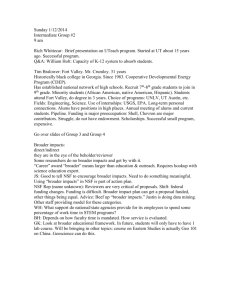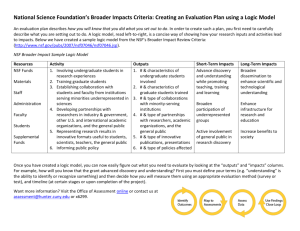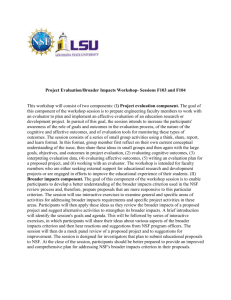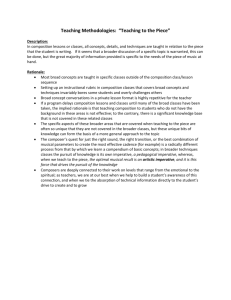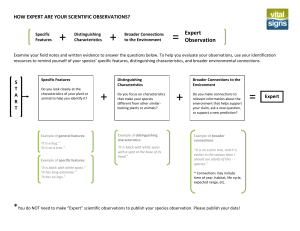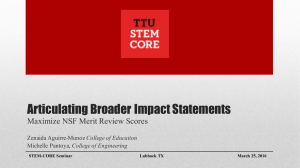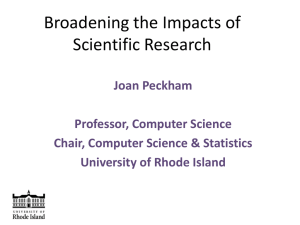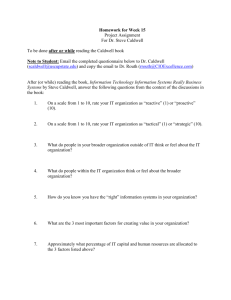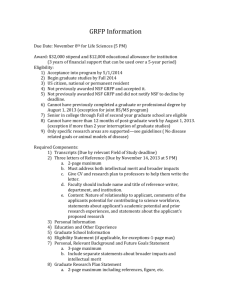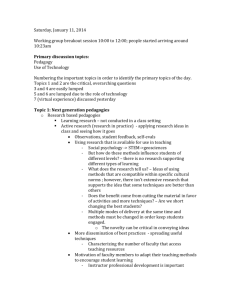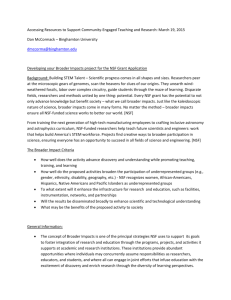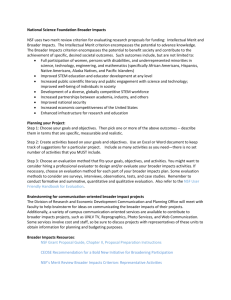Slides
advertisement
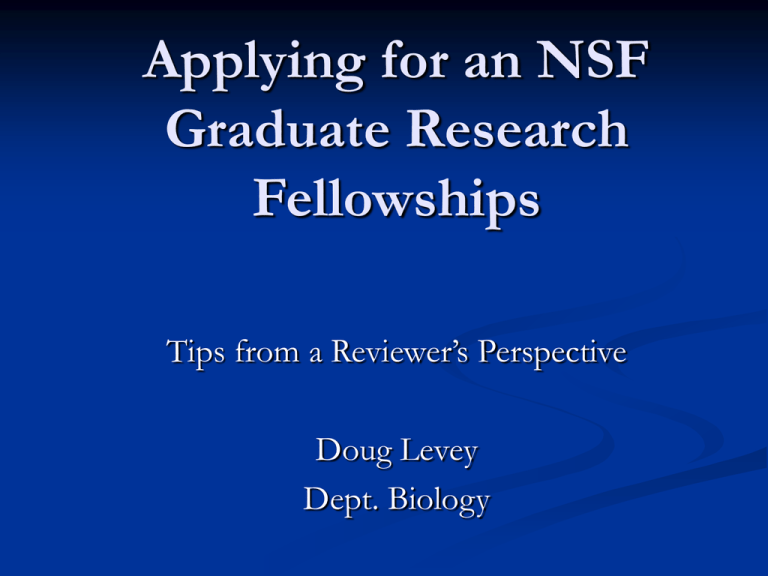
Applying for an NSF Graduate Research Fellowships Tips from a Reviewer’s Perspective Doug Levey Dept. Biology 3 days in DC 30-40 people per panel “calibration” exercise first 15-20 minutes per proposal Random assignment of proposals Reviews written & scores given immediately 3 Levels of applicants, judged separately The Review Process Exciting, Intense, Empowering …. Exhausting, Boring, Irritating Advice Make the proposal about YOU (not just your science) Be personal …. speak from the heart Weave together why you are who you are who you want to become how you plan to get there Where does this go in the application? Broader Impacts Previous Research What is the #1 weakness of most applicants? Broader Impacts Community service Outreach Public talks Volunteer work (science or engineering based) Mentoring Overcoming hurdles (disabilities, gender, socioeconomic, family history, ethnicity) See NSF website for examples Invest a lot of thought in this Get examples of others’ Broader Impacts statements How to craft a Broader Impact statement that rings true A common and effective formula: 1. This is what I believe (with respect to Broader Impacts) 2. This is why I believe it 3. I have a track record 4. I want to do more, and this is how… Make everything Perfect and (painfully) obviously organized Remember reviewers’ task (to write something accurate about Scientific Merit and Broader Impacts) Use different fonts to identify sections and emphasize important points Use graphs, tables, photos: “Visually Stunning” Assume the reviewer does not know your field. State what’s innovative State Hypotheses or Goals -- a must Methods explained; connected to Hypotheses Follow Directions Personal Statement (Marvin Morales) Growing up in Guatemala, I have been deeply influenced by the wonders of tropical forests and their astonishing diversity of animals and plants. I accompanied my father, a subsistence farmer and carpenter, on his expeditions into the jungle to extract timber for his own use. He was thoughtful not to harvest more than what we needed and to minimize use of rare species. I experienced first-hand that the forest was a valuable resource -- our well-being directly depended on it -- and I learned the importance of balancing use and conservation of natural resources. Because my father was also a naturalist (by necessity), he encouraged me to discover and explore the rainforest’s immense biodiversity. In retrospect, I gained a deep curiosity for tropical ecology that fueled a passion to contribute to the science of nature. Personal Statement (Marvin Morales) At age 15, I had to decide on a professional career. In Petén, the region where I grew up, we only had two options: school teacher and accountant. A third option, however, suddenly became available: tourism training. Although I was excited about this new option, my father was definitely not. From his perspective, tourism training was unproven and too expensive. This was a serious roadblock because in that culture, career choices are heavily based on one’s parents’ financial assets and their belief in education, which largely depends on their own education. My parents had practically no money, and neither had completed middle school. I was persistent, explaining to my father that in a country with growing tourism, learning a second language would open many doors. … My mother grew more accepting for my career “choice” and helped convince my father to allow me to pursue a non-traditional path. I proudly graduated with a technical degree in tourism in 1998 In short, I encountered and overcame many challenges commonly faced by Hispanic Americans in the U.S. educational system. I clearly recognize the importance of educating disadvantaged youth about science and conservation. I’ve seen personally that the socioeconomic circumstances of many youth give them the impression that science is beyond their grasp – that other people become scientists. The lack of role models perpetuates that perception. Based on my personal experiences, I am determined to make a difference and confident in my ability to do so through outreach and education. As a role model, I have exposed children to science in Guatemala, and have taught K12 students about natural history in the U.S. I will never forget the students’ excitement about doing science and having fun. I will continue with those activities because I have witnessed how they empower youth from diverse backgrounds, thereby enriching science. This is an essential part of who I am and it will be part of the scientist I become.
